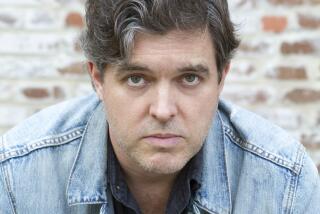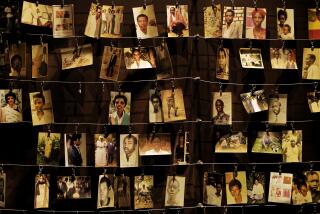Projecting American power — at home
- Share via
In response to Max Boot’s Memorial Day Op-Ed article in The Times, “America is still the best guarantor of freedom and prosperity,” I must say that as much as I love the country that provided me with a wonderful life, I don’t believe that our role is to be the world’s military protector.
Boot writes: “The very fact that the entire world is divided up into American military commands is significant. There is no French, Indian or Brazilian equivalent — not yet even a Chinese counterpart. It is simply assumed without much comment that American soldiers will be central players in the affairs of the entire world.” He notes that we have more than 700 U.S. military bases throughout the world.
My concerns relate to the problems we have in our own country. We constantly worry about the invaders coming over our southern borders; not just the flood of poor people seeking work but also the narcotics merchants and other nefarious gangster types. Where is our National Guard, whose duty is to protect our homeland? A good chunk of it is in the Middle East and Asia fighting wars in service to those who want us out of their countries in the first place.
Yes, we’ve been attacked by terrorists, most notably on Sept. 11, 2001. Before the attack, Al Qaeda leader Osama bin Laden warned us that that he wanted our military out of Saudi Arabia. The Islamic societies of Saudi Arabia and other Mideast nations have a very different culture than ours, and many resent our intrusion into their countries. I’m convinced that if we didn’t have bases in their countries, the terrorists would not feel as great a need to terrorize us.
The price we pay for being the world’s superpower is that so much of our assets are spent paying for it. We are busy building warplanes, warships, military vehicles and munitions even in times of relative peace. We not only sustain a large, expensive military overseas but pay for private armies such as Xe, the security firm formerly known as Blackwater.
We have plenty of problems at home that we could spend our money and personnel on. Aside from the broken borders, we have oil spills, coal mine disasters, floods and many other problems that our government could more ably address if more of our resources and money weren’t spent protecting the world. I suspect that the makers of munitions, warplanes and other such military machinery that profit from global conflict would probably object, but I am convinced that we would be better off using our personnel and money here.
Best of all, thousands of our young people who have died in wars overseas would be alive today.
Melvin H. Kirschner, a medical doctor and bioethicist living in the San Fernando Valley, is the author of “All Medicines are Poison: Making Your Way through the Medical Minefield.”
More to Read
Sign up for Essential California
The most important California stories and recommendations in your inbox every morning.
You may occasionally receive promotional content from the Los Angeles Times.













